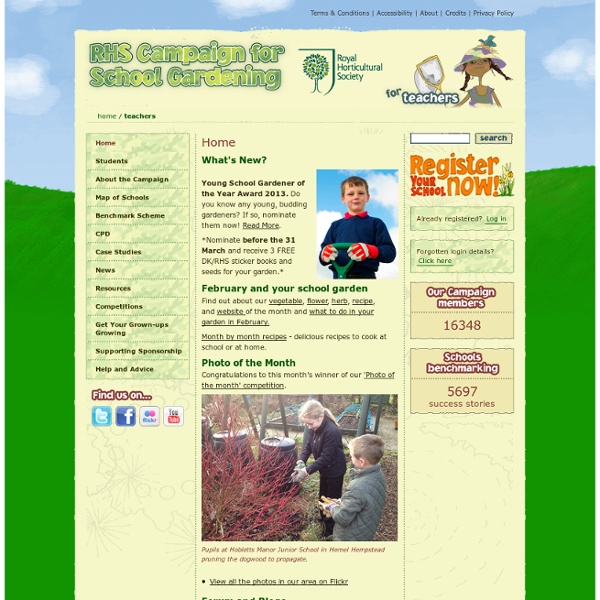



Kids only Ice Station Antarctica New recruits wanted for an online expedition to Antarctica. Are you up for the challenge? Dinosaurs Find out how dinosaurs lived, what they ate, and whether they really died out 65 million years ago. Star attractions Check out some of our most amazing exhibits, including the blue whale and this komodo dragon. Make a volcano erupt See how many different types of volcano you can build in this explosive game. Fun spring activity Create a 5-star hotel for bees and watch them in action. I want to be an 'ologist Want to find out how to become a scientist? Fantastic fossils Explore fascinating fossils found around Britain.
Home / RHS Gardening Interactive Whiteboard Resources: Science, Key Stage 1 & 2- Topmarks Education Our BodiesFlash An excellent lesson on naming the parts of the human body. Ourselves Science ClipsFlash For 5 - 6 year olds, this site looks at differences between living and non-living things, the names of the main body parts of humans and animals and how animals move in different ways. Healthy EatingFlash A series of superb interactive screens which introduce children to healthy eating. Make a Balanced PlateFlash Sort the foods on the plate to see which food groups they belong to. Unmuddle the MealsFlash A drag and drop activity where meals are divided into their ingredients. A Healthy LunchboxFlash Select items for a healthy lunchbox by dragging and dropping the various foods. Farm to Fork ChallengeFlash A game where children see if they know the stages that food goes through from the farm to their plate. Listen and MatchFlash A matching sounds game. Sound and Hearing Science ClipsFlash The Hand Washing ChallengeFlash
Magazines for Headteachers | The Head teacher Magazine KS2 Science Finding out how you move and grow. Can you label the human skeleton? When you've finished move onto the animal skeletons. Do you know which groups living things belong to? Magnets have north poles and south poles. What does a year look like in space? © v2vtraining.co.uk The application consists of two sorting activities and one writing frame to support work towards the end of the unit. Solid, liquid and gas are called the three states of matter. Materials have different properties that make them useful for different jobs. Pupils can research information about teeth types, tooth structure and tooth decay. Use an information panel where pupils can research details about food groups and a balanced plate approach to a healthy diet.Balanced Plate lesson outline An information panel to explains the terms used in, and concepts behind, food chains. This resource consists of a labelling activity, an animation of the water cycle followed by another labelling activity.
Transforming childhood - transforming spaces - transforming learning | Learning through Landscapes naturhuset - Vi skal bygge et Naturhus og en selvforsynende hage på Sandhornøya i Nordland. Prosjektet er sterkt inspirert av arkitekt Bengt Warne, den russiske Bokserien The Ringing Cedars series og vår inderlige kjærlighet og dype respekt for Moder Jord PHILOSOPHIE